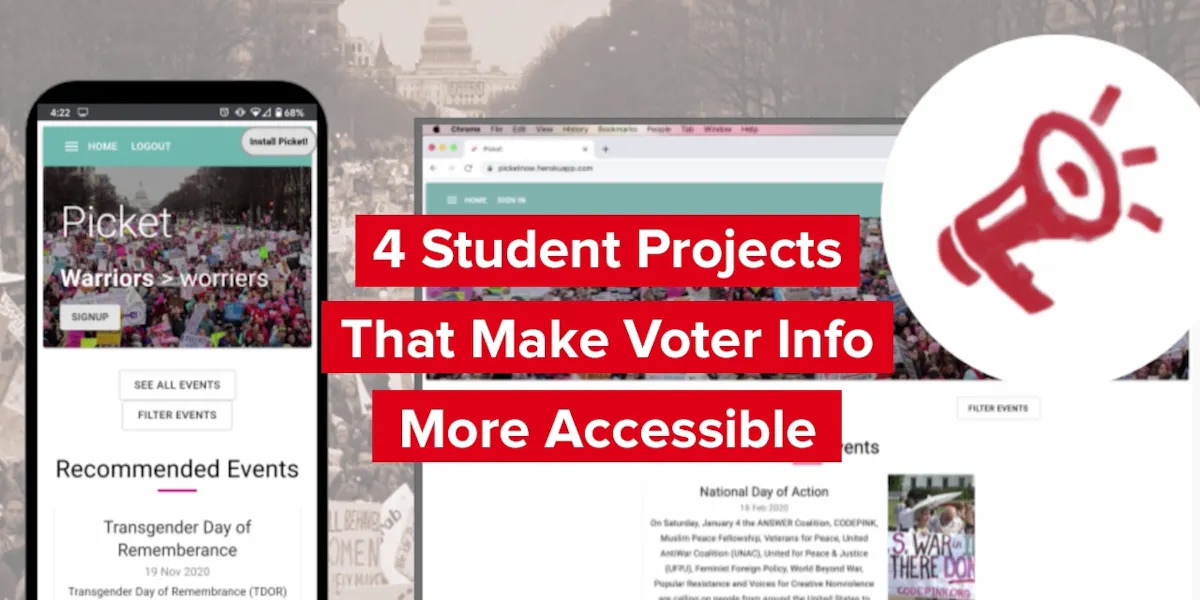Fill out the form to get more information about the Fullstack Academy bootcamp of your choice.
09.11.2025
4 Student Programming Projects That Make Voter Info More Accessible
By Emily Gregor

One thing that makes Fullstack Academy stand out is our project-based curriculum. Throughout our immersive programs—including both full-time and part-time options—students work in pairs, groups, and solo to put their new programming skills to use by creating projects that they care about.
Even in beginner courses like Intro to Code (where students create a webpage using HTML, design a business card using CSS, and craft a countdown clock using JavaScript), we believe the best way to learn is to build an app or functional code and getting hands-on experience that will prepare our students for the real world.
In short, projects make it easier to learn software engineering concepts, Senior Instructor Ben Rodriguez says, “It gives students something to grab onto. When something is too theoretical and has no grounding in practicality, students lose a lot of potential learning connections.
Ben notes that the Fullstack curriculum tries to follow a JIT (Just In Time) learning model, which means, “after students are introduced to a concept during a lecture, we immediately give them a lab or workshop to work on to try to codify what they just learned. All these concepts build on each other as they go through the program.”
Labs and workshops serve as mini projects, where students build functional apps before they get to a major project. When planning their projects, students can choose to focus on creating games, working on solutions for healthcare issues like COVID-19, or even streamlining the job search process.
With the November election quickly approaching, we wanted to highlight four programming projects our students made to increase voter turnout, voter registration, and political participation. Be sure to check them out and make sure you’re registered to vote.
Picket
Picket is a progressive web app created by Fullstack Academy grads Mary Paul, Liz Mitchell, Chloe Jandsten, and Emily Fendler that facilitates activism by letting users with similar interests connect with one another online.
“For this project, we were committed to building something that was equally functional as a mobile app or a website,” Chloe says in the group project presentation. “Which is why we decided to make a PWA, or a progressive web app, a website that’s installable on devices. PWAs are F.I.R.E.—fast, integrated, reliable, and engaging.”
Once users download the app, they can use Picket to find events that align with their interests. For grassroots organizers, Picket can help them promote their event and reach new communities—plus events are easy to update, which is a huge perk of the platform.
VoteAlert
VoteAlert is a Stackathon project created by lawyer-turned-developer (and a Fullstack Academy alum!) Chris Ernst to encourage political participation beyond the general election and ensure users are notified about upcoming state and local races.
“The concept of this app is to have a mobile app on your phone that will send you push notifications when elections are happening that are specific to you,” Chris says in the video presentation.
Know Your Election
Fullstack grad Don Leistman, who now works as a software engineer at Summer, built Know Your Election as a Stackathon project.
An online quiz game that anyone can play in the browser, players are given a blank map and a year and are challenged to re-create that year’s electoral map from memory.
“Once their time is up, we’ll get a score of how many states we got correct,” Don says in his video presentation. “Another aspect of this game is that you can play online with a bunch of your friends with WebSockets.”
iVote
Another project created by Fullstack Academy alums, iVote is a decentralized blockchain app built by Veronica Burnham, Kaitlin Maier, Jolene Langlinais, and Ay-Nur Najm to prevent election fraud and maintain election integrity.
“Every year, lack of access to transportation, voting machine malfunction, and long lines suppress voter turnout,” Veronica says in their group video presentation. “In the modern era, where we have so much available to us at the tips of our fingers, why can’t we create an accessible and reliable way to vote online?”
With iVote, the team wanted to create a modern way to vote safely and securely using blockchain.
Interested in seeing more student programming projects? Subscribe to our YouTube channel for the latest updates.


